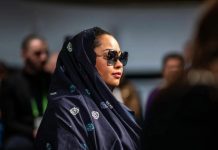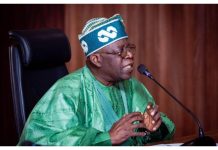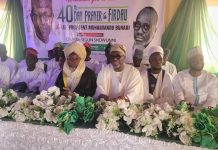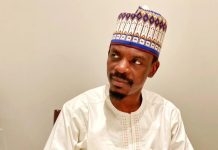Africa Press-Nigeria:
Socio-Economic Rights and Accountability Project (SERAP) has sent an open letter to President Muhammadu Buhari urging him to urgently instruct Mr Lai Mohammed, Minister of Information and Culture, and the National Broadcasting Commission (NBC) to withdraw the Broadcasting Code and Memo threatening to sanction any broadcast that denigrates, disrespects, insults, and abuses president, governors, lawmakers, and other elders and leaders in authority.
The group described the development, as “apparently illegal”, and capable of suppressing meaningful debate among citizens over issues of leadership in the country.
It said, the memo is destructive to people’s exercise of basic human rights, and to democratic politics, as well as contrary to the public interests.
SERAP also asked President Buhari to “instruct Mr Mohammed and the NBC to immediately rescind the fine of N5m imposed on Nigeria Info 99.3 FM radio station, following reported comments by a former Deputy Governor of the Central Bank of Nigeria, Obadiah Malafia, during an interview with the station.”
The NBC last week reportedly issued a stern warning to journalists and broadcast stations, stating: “To denigrate our governors, lawmakers, elders and leaders in abusive terms is not our culture. We respect our leaders as a positive cultural value. The Commission may be compelled to impose sanctions where stations fail to curb this practice.”
In the letter dated 15 August 2020 and signed by SERAP deputy director Kolawole Oluwadare, the organization said: “Rather than pushing to enforce a culture to respect president, governors, lawmakers, elders, and other leaders, Mr Mohammed and the NBC should use their entrusted public office and mandates to promote a culture of public debate, access to information, transparency and accountability in government.”
According to SERAP: “nothing can be more destructive to people’s exercise of basic human rights, and to democratic politics than the suppression of the media, and media freedom. The alleged ‘cultural codes’, which Mr Mohammed and the NBC are now using to punish journalists, broadcast stations and other Nigerians are patently contrary to the public interests.”
SERAP said: “the implementation of the code and the memo would further deter meaningful citizens’ engagement, and have a chilling effect on Nigerians’ human rights, particularly the rights to freedom of expression and access to information, undermine the idea of representative democracy, as well as make public officials less responsive to the people.”
The letter, a copy of which was sent to Mr Lai Muhammed, read in part: “We would be grateful if the requested action and measures are taken within 7 days of the receipt and/or publication of this letter. If we have not heard from you by then that the measures have been taken, the Registered Trustees of SERAP shall take all appropriate legal actions to compel you to do so in the public interest.
“Our requests are entirely consistent and compatible with the Nigerian Constitution of 1999 (as amended), and the country’s international legal obligations, including under the UN Convention against Corruption, the International Covenant on Civil and Political Rights, and the African Charter on Human and Peoples’ Rights, to which the country is a state party.
“SERAP is seriously concerned that the implementation of the code and the memo would lead to unjust punishment and self-censorship among journalists and the media, and exacerbate the growing level of impunity for attacks on media freedom.
“Self-censorship would undermine media freedom and the right to receive and impart information, public debate and further impair the ability of Nigerians to hold to account public officials and politicians accused of grand corruption.
“SERAP is concerned that the action by Mr Muhammed and NBC has further undermined public trust in government and politicians, as it shows that public officials are taking for granted their entrusted public functions, and accountability to Nigerians.
“The speed at which the code and the memo have been issued and applied may lead to public suspicion that the authorities are deliberately pushing to undermine the ability of journalists and the media to report on public interest issues, such as the growing poverty, widespread violence and killings, poor quality education, poor infrastructure and lack of access of millions of Nigerians to basic public goods and services.
“SERAP is concerned that rather than addressing these matters of public interest and revelations of massive allegations of corruption and mismanagement in ministries, departments and agencies (MDAs), your government is devoting time and energy to stop the media and journalists from reporting on the issues.
“Transparency would build trust and confidence in the government. The public interest in transparency and public monitoring of the use and management of the country’s natural wealth and resources by politicians outweighs any perceived cultural injunctions of ‘respect for president, governors, lawmakers and other leaders.’







